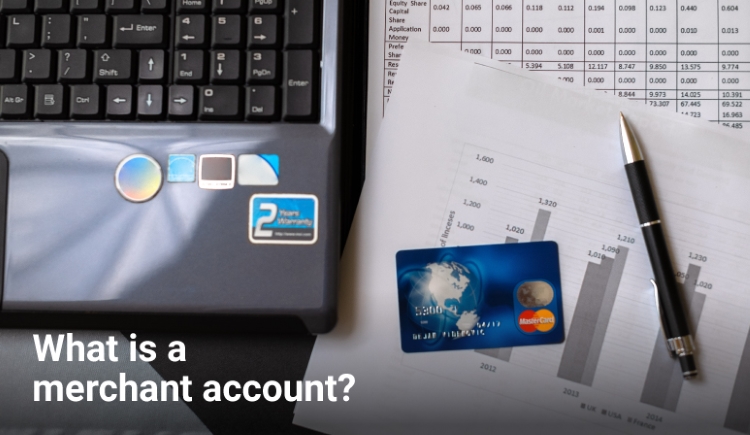- Notifications

We will only notify the newest and revelant news to you.
A merchant account is a type of business bank account that permits businesses to acknowledge and prepare electronic installment card exchanges. This incorporates installments made by means of credit cards, charge cards, and other electronic installment strategies. The essential reason for a dealer account is to encourage the exchange of stores from a customer's account to the merchant's account, guaranteeing that businesses can acknowledge installments in a secure and proficient way.
Merchant accounts are regularly given by procuring banks or installment processors that act as middle people between the commerce, the client, and the card networks (such as Visa, MasterCard, or American Express). When a client makes a purchase employing a card, the installment is handled through the merchant account, and the reserves are eventually deposited into the business’s regular bank account, short of any appropriate expenses.

What is a merchant account?
Having a merchant account is pivotal for any commerce that needs to acknowledge card installments, whether online or in-store. Here are a few key reasons why you need a merchant account:
A merchant account empowers businesses to acknowledge a wide run of payment methods, counting credit cards, charge cards, and versatile installments. This adaptability is fundamental in today's advertisement, where clients anticipate comfort and numerous installment alternatives. By tolerating more installment strategies, businesses can cater to a broader gathering of people and increment deals.
Advertising card installment alternatives moves forward the generally client involvement by giving a fast, helpful, and secure way to pay. Clients are more likely to total a buy in the event that they can utilize their favored installment strategy, driving to higher client fulfillment and dependability.
Tolerating card installments can lead to expanded deals and income for businesses. Clients who pay with cards frequently spend more than those who pay with cash, as card exchanges permit for bigger buys and motivation buying. Additionally, businesses that acknowledge card installments can reach a more extensive gathering of people, counting online customers.
Merchant accounts streamline the installment preparation, guaranteeing that reserves are exchanged rapidly and effectively. This makes a difference when businesses oversee their cash flow more successfully, lessening the time spent holding up for checks to clear or managing with cash stores. With quicker access to reserves, businesses can keep up superior control over their accounts and arrange for development.
Merchant accounts come with built-in security highlights and compliance with industry measures (such as PCI DSS) to secure against extortion and information breaches. Installment processors utilize encryption and tokenization to securely exchange information, giving peace of intellect for both businesses and clients. This security is basic in building belief and securing delicate data.

Why do you need a merchant account?
Whereas both merchant account vs business bank account are basic for overseeing a business's accounts, they serve diverse purposes and have unmistakable highlights.
Here's a comparison to highlight the contrasts:

Merchant Account vs Business Bank Account
The scene of merchant account administrations is ceaselessly advancing, driven by mechanical progressions and changing customer behaviors. Here are a few future patterns to observe for:
Merchant account administrations progressively coordinate with developing innovations such as counterfeit insights (AI), blockchain, and the Web of Things (IoT). AI can improve extortion discovery and client analytics, whereas blockchain offers secure and straightforward exchange records. IoT can encourage consistent installments through associated gadgets, making unused openings for businesses.
The rise of versatile and contactless installments is forming long-standing time of merchant accounts. With the developing notoriety of versatile wallets (such as Apple Pay, Google Wallet, and Samsung Pay) and contactless cards, businesses must adjust to acknowledge these installment strategies. Merchant account suppliers are creating arrangements to bolster consistent versatile and contactless exchanges, upgrading the client involvement.
As cyber dangers proceed to advance, merchant account administrations are centering on improving security measures. This incorporates executing progressed encryption, tokenization, biometric confirmation, and AI-driven extortion anticipation devices. Guaranteeing the most elevated level of security is pivotal for keeping up client belief and compliance with industry controls.
Leveraging information analytics, merchant account suppliers are advertising personalized encounters for businesses and clients. By analyzing exchange information, businesses can pick up experiences into client behavior, inclinations, and investing designs. This empowers them to tailor promoting methodologies, dependability programs, and advancements to personal clients, driving engagement and deals.
The method of setting up a merchant account and coordinating it with existing trade frameworks is getting to be more streamlined. Merchant account providers are centering on rearranging the onboarding handle, lessening printed material, and advertising easy-to-integrate arrangements. This makes it less demanding for businesses, particularly little and medium-sized endeavors, to begin tolerating card installments rapidly.
As businesses grow universally, the request for worldwide installment arrangements is developing. Merchant account administrations are advancing to bolster cross-border exchanges, multi-currency preparing, and compliance with worldwide controls. This empowers businesses to cater to a worldwide client base and grow their reach.
A merchant account is a basic apparatus for businesses looking to acknowledge electronic installment card exchanges. It offers various benefits, counting expanded deals, improved client involvement, moved forward cash stream administration, and strong security. Whereas particularly from a business bank account, both are significant for overseeing a business's monetary operations. As innovation progresses and customer behaviors move, merchant account administrations are advancing to meet unused requests. Integration with developing innovations, the rise of portable and contactless installments, improved security measures, personalized client experiences, simplified onboarding, and worldwide installment arrangements are key patterns forming long-term merchant accounts. By remaining educated in these patterns and leveraging the benefits of a merchant account, businesses can position themselves for victory in a quickly changing monetary scene.
Latest news & insights from around the world brought to you by One IBC's experts
We are always proud of being an experienced Financial and Corporate Services provider in the international market. We provide the best and most competitive value to you as valued customers to transform your goals into a solution with a clear action plan. Our Solution, Your Success.